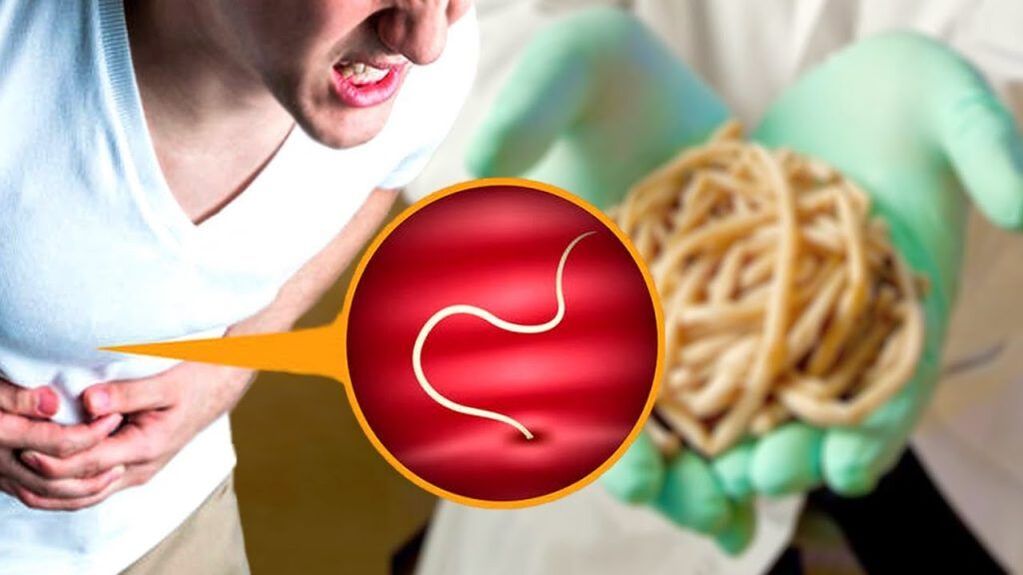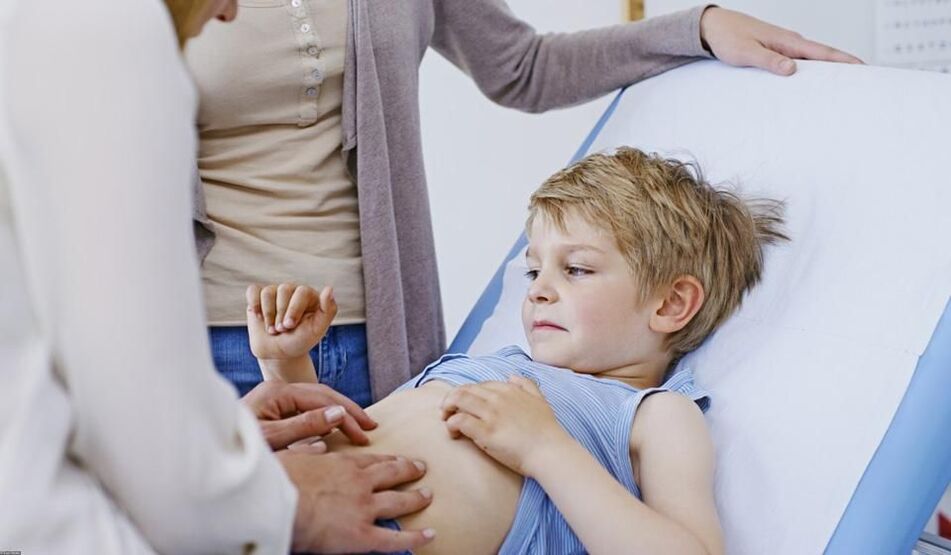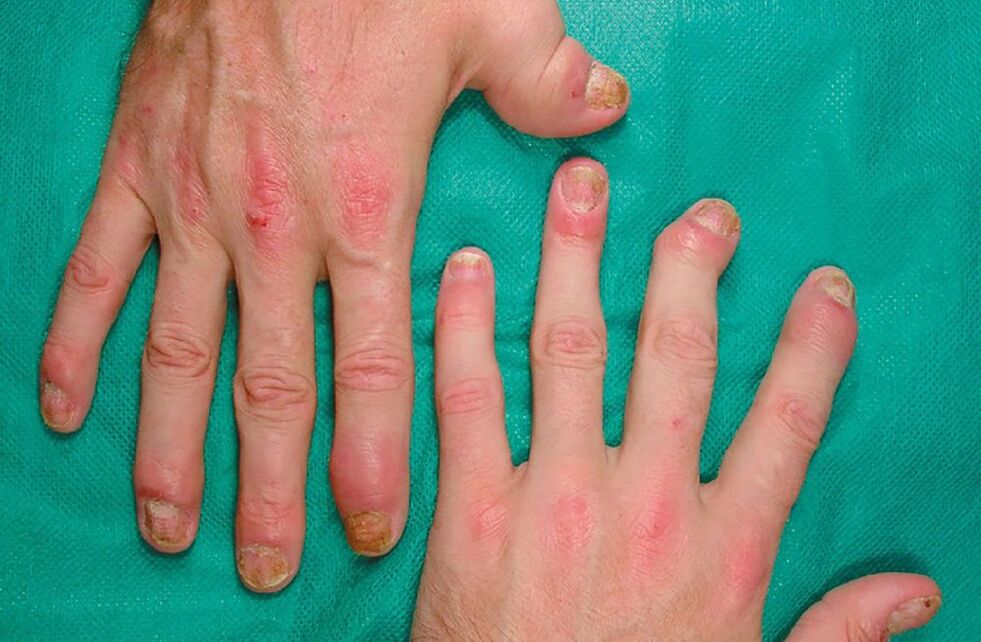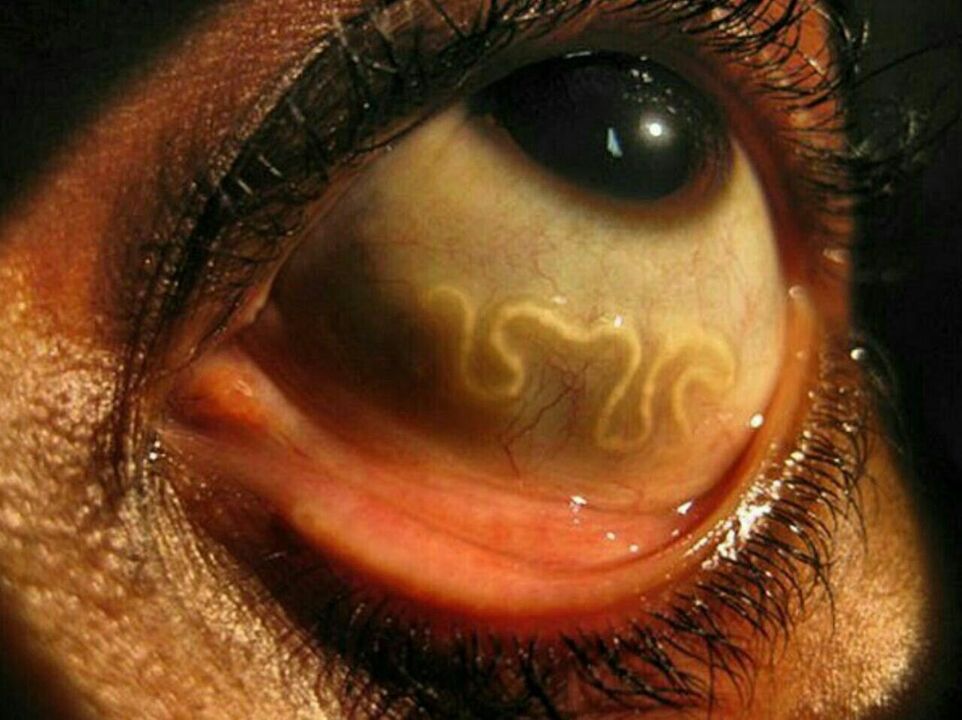
Helminthiasis is a common problem among certain categories of the population. In children, as a rule, pinworms are parasitized, diphyllobotriasis is often diagnosed in people who eat fish, and trichinosis is more common among hunters.
Extensive research has shown that human worms can cause many diseases that have nothing to do with helminthiasis. In particular, there is a theory that helminthic diseases are associated with the development of oncological processes.
In addition, you should know that if there are helminths in the body, it does not mean that the patient will show signs of such an infection. Signs of their presence can be disguised as other diseases of the liver, gallbladder, gastrointestinal tract. As a result, a person can use different means for a long time and can not detect the infection. And the disease can be treated after choosing the right scheme of anthelmintic treatment for the patient. So ask yourself: "What should I do if I have helminths, how can I check for parasites and infect my loved ones? ", You should not be afraid to contact a doctor and get all the answers, and also learn what to do if you have worms.
Read the article below to find out what worms are, how dangerous such parasites are, and how to avoid getting infected with different types of parasites. We will also talk about the symptoms of both general and specific worm infections.
How to get helminths?

Helminth eggs can enter the human body in different ways. There are four main ways of infection:
Biohelminthoses. Worms can be found in raw or poorly processed meat, as well as in fish. Lard, barbecue, dried fish, sushi, etc. can be infected by consuming.
Geohelminthoses. Adult helminth eggs in soil and water enter the body. They find themselves in this environment, and human feces as well as animal feces enter it. Infections also occur when humans come in contact with animals, such as constantly expelling cat or dog feces, as well as when food is contaminated with fly eggs.
Contact. The most common worms, pinworms, are transmitted from person to person. In this case, the risk of contracting the disease is highest.
When insects bite a person, a number of parasites can enter the body.
When trying to answer the question of where worms come from and how they are transmitted, it should be borne in mind that the main route of infection with parasites is oral feces. That is, when a person eats food and drinks water, he simply swallows the eggs of worms. More rarely, worms are found in a person after being bitten by an infected insect.
Infection with worms through the soil
Soil, sand, etc. After contact with it is necessary not only to wash your hands very well, but also to clean your nails. It is better for children to cut their nails very short. All vegetables grown on the ground should be washed very carefully and, if possible, boiled in hot water.
Animals and flies
Wikipedia shows that worm eggs can be seen at home and from pets - cats and dogs walking on the street. If children play with such animals, the risk of infection is high. Therefore, if you suspect that cats have worms, you should take immediate action. Symptoms and treatment of infection in animals can be obtained from a veterinarian or watch a video on the network. In this way, all kinds of worms can appear on the body. Therefore, the answer to the question of whether they can be transmitted from dog to human and from dog to dog is ambiguous: yes, it is possible.
Another carrier of helminths is flies. They can first land on feces and animal waste, and then fly away and land on food. As a result, they spread helminth eggs, and humans develop helminthic diseases after infection.
How do worms pass from person to person?
How can pinworms be acquired and do these parasites pass from person to person? The answer to this question is simple: if a female pinworm crawls through the intestines along the rectum at night in the baby's pope, she can lay a large number of eggs near the anus - up to 5, 000. As a result, severe itching occurs, the baby itches, and the eggs fall into their hands. In addition, the eggs fall from the baby's hands into clothes, bedding and other items touched by the baby. It is clear how the worms are transmitted: other children and adults become infected with eggs, after which small white pinworms multiply in the body. Therefore, it is very important to wash your hands before eating and after coming home from public places.
Waterborne infection

Many parasitic eggs are found in open water bodies, as well as in well waters. Therefore, people who use such water should use a special bactericidal filter. It is also very important to boil the water that people drink and eat the food made from it. It is very dangerous to absorb water from reservoirs.
When talking about what helminthiasis is, it should be borne in mind that it is a disease that mainly affects children, because they are very susceptible to helminthiasis. The fact is that in children, protective barriers have not yet developed as in adults, and gastric acidity is lower.
Also, signs of worms in a child are often seen in the fact that young children taste everything they can in the process of mastering the world. Therefore, parents often notice the symptoms of helminthic infestation in children, in particular, itching of the anus, anorexia, cough in children during infection, etc. feel. However, it is still impossible to teach a baby to follow the rules of hygiene. in the first years of his life. Therefore, the risk of infection is high for all family members.
When talking about egg worms - what is it and how to treat this disease, it is necessary to remember that worms do not multiply in the human body. Worms in the human body die within a certain period of time. For example, pinworms live for several weeks, roundworms - about a year. Eggs laid by adult parasites on the body will inevitably leave the intestines - either when feces or baby feces come out or enter the skin near the anus, as with pinworms. When eggs are outside the human body, they grow in the external environment, then re-enter the human body and parasitize there.
Because worms do not multiply in the body, a large number of helminths are observed only when re-infection occurs and the eggs re-enter the body through the mouth.
Therefore, if re-infection does not occur, pinworms living in the body die within about 4 weeks. And if you follow all the preventive measures very carefully, you can get rid of the presence of worms without treatment. However, it is very difficult for children to follow all these rules.
Signs of helminths

When infected with parasites, humans show some of the first signs of worms. If you have an infection, you can learn more about the symptoms of worms from a specialist. However, in humans, some of the symptoms of worms may appear spontaneously.
Thus, the most striking sign of parasitic infection is acute weight loss. The patient's skin also becomes pale - this is how anemia manifests itself. The appearance also shows signs of helminthic invasion - a person looks tired, his level of fatigue may increase.
If the intestines are infected, helminths cause itching in the anus. However, they can also parasitize other organs - the lungs, liver, bladder, and even the arms or legs.
However, all of the above symptoms of parasites in the human body are only the first common signs of infection, which allows us to accept that the body is massively damaged by worms and that something is wrong with health. Adults have other, more specific symptoms of helminthic infestation. The patient may perceive them as a manifestation of other diseases. At the same time, such diseases can be treated for a long time, of course, fail. This continues until the exact cause of such symptoms is determined - helminthiasis. You can find more information about this in the relevant videos on the network.
What are the symptoms of worms in adults and a child?
Digestive disorders
If the parasites are localized in the intestines and not in other organs, the main symptoms in adults and children are digestive disorders. A person may be bothered by constant diarrhea or constipation, with occasional nausea, vomiting, stomach pain, pain in the right hypochondrium, near the navel, and intestinal disorders. If intestinal parasites are injured, flatulence is often a concern.
All of these symptoms can be strong or weak, long-term or periodic. It all depends on the severity of the infection. There are types of helminths that produce hormone-like substances, under the influence of which constant diarrhea develops. If large worms grow (for example, tapeworms), they close the intestines and cause constipation.
General disorders, disorders of the nervous system
Whether or not parasites live in human blood, liver, or lungs, worms live and secrete large amounts of toxins. The more widespread the infection, the more obvious the signs of intoxication of the body, which adversely affects the nervous system.
As a result, headaches, dizziness and nausea develop. Some people confuse these symptoms with the development of migraines, and as a result take painkillers.
Sometimes when infected with parasites, the temperature rises, joint pains are disturbing. In addition, helminthic lesions cause a lack of vitamins and nutrients in the body. This phenomenon, as well as depression of the nervous system, leads to the manifestation of chronic fatigue syndrome. The patient feels tired, worried about drowsiness and weakness of the body. If we talk about a child, he is naughty, always nervous. Young children are sleep deprived, crying or screaming at night. School-age children can read poorly due to carelessness and fatigue.
Allergies and skin manifestations

Symptoms of helminths Worms cause skin deterioration. Toxins that worms infect the body have a negative effect on its general condition and can cause various skin reactions. Eruptions occur as a result of the release of histamine from mast cells and the accumulation of a liquid portion of blood in the tissue with the rise of the epidermis.
The same reasons lead to the development of allergic reactions. In particular, itching, red spots, acne, urticaria, as well as dry cough, allergic rhinitis, bronchial asthma may appear. Also, when infected, nails can be grafted, brittle hair is noted, and cracks appear on the heels.
Deterioration of immunity and infectious diseases
Because worms feed on the body, they secrete toxic waste. Toxic effects, deficiency of vitamins and minerals in the body, significantly worsen the immunity of the infected person. As a result, the health condition worsens in chronic diseases, inflammatory processes in the nasopharynx begin to worry - sinusitis, stomatitis. Vulvovaginitis and bacterial vaginosis are possible in women and girls. With long-term infection with pinworms, there is evidence that the development of inflammation of the appendages is possible. In this case, it is very important to detect their presence in time. Parasites in the liver also cause bad breath and persistent bad taste.
One person has the idea that worms provoke the appearance of snoring and grinding teeth at night. However, this connection has not been proven yet.
Where do parasites live in the human body?

The types of parasites in the human body are determined by their exact location. How to detect the presence of parasites and how to remove them from the body depends on their type.
transparent
These worms live mainly in the intestines, in different parts of it. Hookworms, roundworms, broadworms and other bands are localized in the small intestine. In the small intestine live chicken tapeworm, pinworms, whipworm in the large intestine. In total, there are about a hundred void parasites. Pictures and images can be found online.
piece
In humans, these worms live in organs and tissues, not in the intestines. There are species that live in the brain (cysticercosis), liver (echinococcosis), lungs (paragonimiasis), muscles, lymphatics (filariasis) and other helminths.
You can still learn from a specialist what worms are in a person.
The roundworm is a species that belongs to both luminal and tissue parasites, because in the early stages of its development, they can infect any organ by moving through the blood. How to get rid of Ascaris will be explained by a doctor who prescribes a treatment regimen for infection with such parasites.
How worms look in humans can be found by looking at the shape of the appropriate type of parasite. Special literature shows what worm eggs look like.
Symptoms of infection depending on the type
How worms manifest themselves and how dangerous they are depends on the type of parasite, exactly where the organism lives, and the intensity of the infection. In humans, signs of invasion may appear after a few days. For example, if you see roundworms, your health will deteriorate after 2-3 days. When infected with other types of helminths, the first symptoms appear in the patient after 2-3 weeks. The incubation period of filariasis is 6 to 18 months.
Intestinal worms are dangerous in the sense that if there is only one individual in the intestine, it is impossible to understand that a person is infected because there are no symptoms. Certain symptoms may be bothersome only when the worms are long (ascarides, broad band, etc. ) or when a mass infection occurs. Almost all helminthiasis is accompanied by headache, fatigue, dizziness, irritability.
What are worms, what are they called and what do they look like?
Pinworms (enterobiasis) - you can determine the presence of this type of helminths by the appearance of the main symptoms, as well as by the appearance of itching in the anus, which intensifies at night. If there are only a small number of pinworms in the body, the itching may last for several days, then reappear after a few weeks. With a strong occupation, itching can be felt constantly.
Ascarid - what are the symptoms of ascariasis, it depends on the stage of development of the parasite. During the phase when the larvae migrate to the heart, lungs and other organs, there is weakness, subfebrile fever, cough, with sputum, sometimes pus and blood. In this case, if an X-ray of the lungs is performed, then the volatile infiltrates are visible and then disappear. Allergic reactions develop, a blood test shows a large percentage of eosinophils. If the invasion is strong, there is a possibility of developing bronchitis, pneumonia, asthma attacks. Do people often wonder if they can cough when they are infected? Indeed, it is possible. You may also feel a sore throat. The symptoms of the second stage are associated with digestive disorders. Roundworms produce substances that neutralize pepsin and trypsin, human digestive enzymes. As a result, proteins are not digested and the patient loses a lot of weight. Complications with ascariasis sometimes manifest themselves - pancreatitis, obstructive jaundice, intestinal obstruction, appendicitis.
Ankylostomiasis, schistosomiasis, diphyllobotriasis, trichuriasis - anemia and beriberi develop with such lesions. After all, the toxins secreted by helminths of these species significantly worsen the intestinal microflora, leading to the development of dysbacteriosis.
Opisthorchiasis, fasciolosis, clonorchosis are liver parasites. Outcomes of the invasion are icteric syndrome, enlarged liver, spleen, pancreatitis, cholecystocholanitis, neurological disorders, pathologies of the digestive system.
Trichinosis - the most common symptoms of such a lesion are muscle pain, swelling of the eyelids, swelling of the face, fever.
Strongyloidiasis - causes roundworms, the symptoms are very diverse. Dyspepsia, allergies, biliary tract dysfunction, etc. may have symptoms.
Genitourinary schistosomiasis is a diuretic disorder caused by flatworms. At the end of urination, blood is found in the urine. In men, it can cause pathological lesions of the prostate, pathology of the seminal vesicles. In women, vaginal bleeding results in damage to the genitals. Bladder fibrosis may appear.
Cestodosis - causes tapeworms. These include cattle, sheep brains, echinococci, tapeworms, and more. . Symptoms of the disease are severe weight loss, weakness, dysfunction of the gastrointestinal tract.
How to determine the presence of worms in a person?
If certain symptoms of an infection are disturbing, a person is naturally concerned about how to understand whether helminths are present. Of course, you can tell for sure whether you have an infection only after consulting a doctor and performing all the necessary tests. But there are other ways that are suitable for those who are interested in learning how worms exist. To do this, you need to carefully monitor your health and pay attention to changes in the body. After all, the presence of some obvious symptoms answers the question of how to understand the presence of worms.
Prevention of worm infections

To prevent infection, you need to understand exactly what causes invasion, what helminthiasis is, and what worms are. It is important to take all preventive measures that significantly reduce the likelihood of infection.
- Fruits and vegetables should be washed thoroughly and hot water should be poured over them.
- Fighting flies, cockroaches, mosquitoes - it is important to track where they come from and destroy them.
- Cook meat and fish for at least 40-60 minutes.
- You only need to use your own hygiene products - towels, combs (to prevent the transmission of lice), etc.
- It is important to teach the baby before eating, as well as to go immediately after each contact with animals and wash their hands with soap and water.
- If there are large and small animals in the house, they should be constantly provided with funds to prevent worms. You should contact your veterinarian to find out which ones.
- It is important that the youngest children play only with clean toys, and a fallen pacifier or pacifier should be washed immediately.
- Children need to be kept away from bad habits, such as sucking their fingers, biting their nails, and taking things in their mouths.
- The baby should have clean and short nails.
- To prevent re-infection with pinworms, the baby should wear tight panties at night, which prevents the spread of parasites and eggs in the bed.
- It is important to iron children's clothes after washing.
- In the morning it is necessary to change panties and wash the child thoroughly.




































